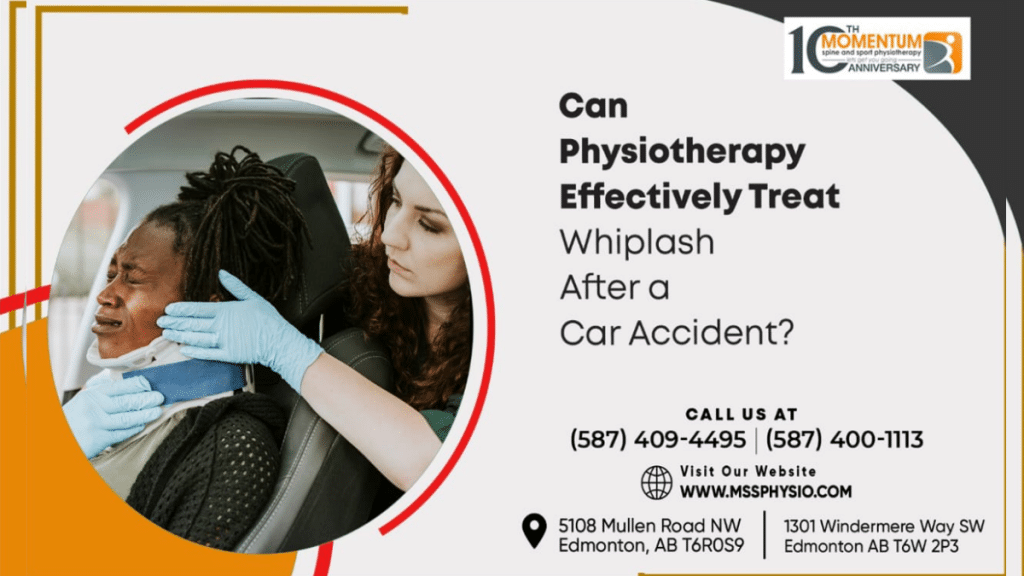Experiencing neck pain after an accident is a common and often debilitating aftermath of a car crash. Whiplash, a typical injury resulting from such incidents, can lead to prolonged discomfort and limited mobility. Fortunately, physiotherapy has been recognized as a highly effective method for treating these symptoms. Specifically, motor vehicle accident physiotherapy in Edmonton offers targeted treatments designed to alleviate pain and restore function.
Whiplash happens when the head suddenly gets jerked back and forth, straining the neck muscles and ligaments. The impact of this can vary from mild discomfort to severe, chronic pain and stiffness. Engaging in accident physiotherapy soon after the incident can significantly enhance the recovery process, addressing the root causes of pain and facilitating a faster return to normal activities.
Each treatment plan is structured to the individual’s specific needs, ensuring that recovery is not only achievable but also sustainable.
Early Assessment and Treatment
Immediate assessment and treatment following a car accident are vital. Motor vehicle accident physiotherapy in Edmonton focuses on evaluating the extent of neck injury and implementing a treatment plan to manage pain and induce healing. Early intervention helps to prevent chronic pain and additional complications associated with whiplash.
Techniques in Motor Vehicle Accident Physiotherapy for Treating Whiplash
Pain Management Modalities
During the acute phase of whiplash recovery, various pain management modalities are utilized to alleviate discomfort and facilitate healing, including:
- Ice Therapy: Applying ice helps reduce inflammation and numbs the affected area, providing immediate pain relief.
- Heat Therapy: Heat relaxes and loosens tight muscles and improves circulation of blood to the affected area, aiding the healing process.
- Ultrasound: This modality uses sound waves to penetrate muscle tissues deeply, promoting cellular repair and pain relief.
- Electrical Stimulation: Electrical impulses are used to stimulate the muscles, helping to reduce pain and strengthen muscle fibres.
- Shockwave Therapy: This modality uses high-energy sound waves directed at the injured area to accelerate tissue repair and cell growth, effectively reducing pain and enhancing mobility.
- Dry Needling: This is done by inserting thin needles into affected muscle trigger points to release knots and relieve muscle pain and tightness. This can help alleviate the neck and shoulder muscle tension commonly associated with whiplash injuries.
These modalities are effective for managing pain and accelerating the natural healing process, offering significant relief from the symptoms caused by whiplash.
Manual Therapy for Neck Pain
Manual therapy is a fundamental component of motor vehicle accident physiotherapy in Edmonton, especially for addressing the aftermath of whiplash injuries. This form of therapy involves the skilled physical manipulation of the neck muscles and joints by a trained physiotherapist to alleviate the discomfort associated with whiplash. The techniques employed include:
- Soft Tissue Massage: This technique helps relax the muscles, increase blood flow, and decrease muscle tightness, which can significantly alleviate pain and aid in healing.
- Joint Mobilization: Gentle movements and manipulations of the joints in the neck help to increase flexibility, enhance range of motion, and reduce joint stiffness.
- Manipulation: More direct manipulation can realign the cervical spine, relieve pressure points, and improve overall neck function.
These manual therapies are crucial not only for reducing neck pain immediately after an accident but also for decreasing stiffness and enhancing range of motion, thus facilitating a quicker recovery process.
Therapeutic Exercises to Strengthen and Stabilize
Therapeutic exercises are meticulously designed to strengthen the muscles around the neck and upper back and to aid in the recovery from whiplash. These exercises include:
- Strength Training: Targeted exercises to build the strength of neck and upper back muscles, providing better support and stability for the spine.
- Flexibility Routines: Stretching exercises integrated into the therapy plan help improve flexibility and reduce tension in the muscles affected by whiplash.
By improving strength and enhancing mobility, these exercises play an important role in the long-term recovery and functional improvement of individuals experiencing neck pain post-accident.
Posture Correction
Part of the recovery process involves education on posture correction. This aspect of therapy is essential for preventing additional strain on the neck, which could exacerbate pain and delay recovery.
Teaching patients how to maintain neck-friendly postures during daily activities is another critical component. This training includes:
- Correct Sitting Posture: Educating patients on maintaining a straight back with shoulders slightly pulled back while sitting. The head should be in a neutral position, not protruding forward, to minimize pressure on the neck.
- Proper Standing Alignment: Patients are taught to stand with their weight evenly distributed on both feet, knees slightly bent to ease pressure on the spine, and shoulders aligned over hips.
- Movement Techniques: Training in how to turn the whole body instead of twisting at the waist and keeping the neck aligned during physical activity helps prevent undue stress on cervical tissues.
This educational component ensures that patients adopt lifestyle changes that support their recovery and prevent future episodes of neck pain. It’s not only about treating the current symptoms but also about instilling habits that will promote long-term health and prevent re-injury.
Long-Term Recovery and Rehabilitation
Consistent physiotherapy sessions are critical for long-term recovery from whiplash. These sessions help to reinforce healthy neck mechanics and strengthen the supporting muscles, minimizing the risk of future neck problems. As recovery progresses, the focus shifts from pain relief to restoring full functionality and preventing the recurrence of injury.
Enhancing Recovery from Whiplash with Specialized Physiotherapy
At Momentum Physiotherapy, we provide targeted interventions for those recovering from whiplash due to car accidents through motor vehicle accident physiotherapy in Edmonton. Our approach to car accident physiotherapy focuses on alleviating pain, restoring mobility, and speeding up the recovery process through evidence-based techniques and personalized care plans.
Engaging with a physiotherapist can be a critical step towards recovery for those affected by a recent car accident. If you’re suffering from symptoms of whiplash, consider reaching out to Momentum Physiotherapy. We are here to assist you in your journey to regain comfort and mobility, ensuring a smoother and more effective recovery.
